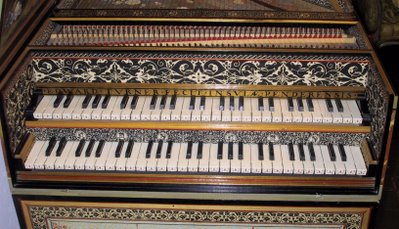I couldn't help thinking about his comment that Mozart, were he alive now, would be playing a modern piano. I'm not so certain. He definitely would not be playing a pianoforte- that I can accept. But would he play a modern piano? Like Bach, Scarlatti, and Beethoven, (and many other famous composers) Mozart was always looking for the best - instruments that were capable of expressing every nuance of their artistic vision, instruments that did not interfere with this expression, and which were the ultimate interface between emotion and sound. I would tend to think that Mozart, were he alive today, would not be writing music that sounded anything like the Mozart that we know. Mozart would probably be a composer of mega Broadway musicals, and he would probably moonlight as a keyboardist in a punk band at night. Bach would be behind a stack of electronic keyboards hooked up to a powerful computer, carefully crafting his mathematical fugues with 144 different counterpoint lines. In his lifetime, Bach accumulated quite a good collection of keyboards, mostly harpsichords, but as well he had a number of clavichords, and interestingly enough, two lautenwerks. I think that is pretty indicative of the fact that he was after the latest and greatest, and was not necessarily married to harpsichords or pipe organs. It’s just that these were the instruments of the day, and that is what he composed for.
The “limitations” or idiomatic particulars of each instrument are critical in understanding music composed specifically for that instrument. The harpsichord is not capable of a great deal of difference in volume, no matter how hard you pound on the keys (and this does the instrument no good whatsoever). To vary the volume within a piece of music a composer simply wrote in more notes. More notes, more sound, less notes, less sound. To play Bach on the piano, no matter how beautiful played, is a bit anachronistic. To play Mozart on a modern piano is similarly out of context, but the results in both cases probably justify the transposition. Glenn Gould owned a harpsichord and played it to work through much of what he later recorded on a piano. The nuance and subtleties that the mechanics of the earlier instrument provides often gives an important insight into the mind of the composer and what he was trying to create.
The harpsichord was in general use for over 400 years until the piano reached a state of development that made it a practical instrument. The harpsichord, then, can be considered a fully developed and “finished” instrument. It has reached the zenith of its technological evolution. Modern “enhancements” the use of metal, plastic, and plywood, have not been generally regarded as improvements, and in the field of harpsichord building, authenticity is regarded as the hallmark of a fine instrument. The same cannot be said for pianos. There are several historical instances of early pianofortes being converted into harpsichords, which tells us that early pianos were probably not the best. With the advent of mass produced cast iron and factory made movements of great precision, even a person of modest means can own an instrument that would have been a technological marvel in Mozart’s time.
In my opinion, Professor Silverman is correct in his conclusions of why playing Mozart on a modern piano is justified. I’m just not convinced it’s because that’s what the original composers would have done had they been alive today. I’m also equally certain that they would not be composing the type of music that the constraints and idiosyncrasies of their instruments afforded them.
In a way, this is almost the opposite of the issues that we face in Winter Harp. Some of the instruments we play are very ancient indeed, but we are by no means early music purists. Using early instruments- Celtic harps, psalteries, clay drums, etc. is mostly a conscious decision to avoid the familiar sound of their modern counterparts. What’s curious is that many people have commented that some of our instruments have a decidedly electronic sound to them.
I guess you can only relate to what you know…

No comments:
Post a Comment